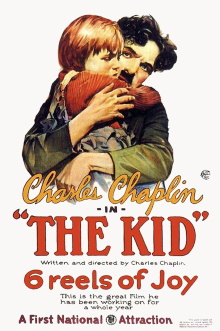This was added to my list because I thought it appropriate to properly sit down and watch at least one Charlie Chaplin film. I’m sure most of us have childhood memories of watching snippets on the television but I don’t think I’ve ever watched one in its entirety. This one is considered one of his best and is the first full-length film he directed himself. He is also surprisingly credited for the musical score and yet it is child actor Jackie Coogan who steals the show. Unfortunately Coogan’s personal story would later turn out to be one of the earliest examples of child actors being taken advantage of by their parents.
The story is so classical that it hardly needs to be retold. A penniless single mother gives birth to an infant in a charity hospital and decides to give him up. She leaves him in a car, perhaps thinking that whoever the owner is must be at least well off, but a couple of thieves steal the car shortly afterwards. They simply leave the infant on the street where he is found by Charlie Chaplin as the Tramp. After trying and comedically failing to give the infant to someone more suited, he becomes resigned to raising him himself. Cut to five years later and we have the adventures of these two on the streets as they scrounge and scam for what they need to survive on a meagre lifestyle. Naturally destiny ensures that the child will one day meet his mother again and she has since become a rich and famous actress.
The only deviation from the standard here is that there is dream sequence in which the tramp imagines himself in heaven, angelic wings and all. Yet, tellingly, even this paradise doesn’t last long for him as the temptations of hell infiltrate even heaven as he soon becomes a victim of unfair persecution, just as he is on Earth. The film is short, well-made, and as expected from Chaplin, not so much comedic as tragicomic. Most of the visual gags are based around them making do with scavenged scrap and rubbish. The standout performer is Coogan who acts so well and looks so adorable here that it’s no wonder he became an instant star. But as I noted, he is also the textbook case of the now familiar story of the child actor being exploited by parents as the millions he earned, even then, from film appearances and merchandizing deals were all gone by the time he became an adult.
Some critics note that this film has autobiographical elements from Chaplin’s own life, reflecting his own childhood in London where he was sent to a workhouse before he was 9 years old. However I find myself noting that though the Tramp is indeed poor, he is not completely deprived of means. He does at least seem to have his own roof over his head and access to regular meals, thus fulfilling the minimum requirements to provide the Kid with a decent upbringing. I also find it interesting in that the film mostly makes fun of the Tramp himself and doesn’t seem to blame the rich for his place in society. It’s actually hard to root for the Tramp teaching the Kid to break windows so that he can earn money from repairing them. Plus of course it is glorious for the mother to strike it rich, so it’s not like this is exactly a searing critique of capitalism.
Overall this film was about what I expected with the only surprise being the earnestness that Coogan put into the role. I can see why films like these were such a success back then but I don’t think there’s much reason for us to go back to them for. I find that I actually prefer Buster Keaton’s silent because of the incredible physicality that he puts into his stunts which still hold up today.
